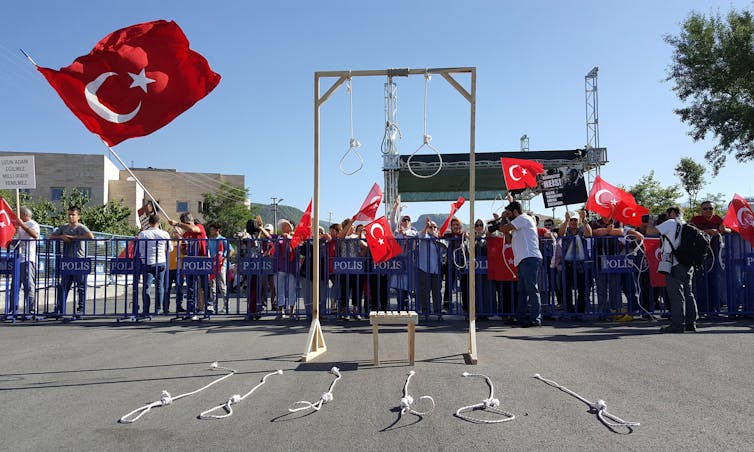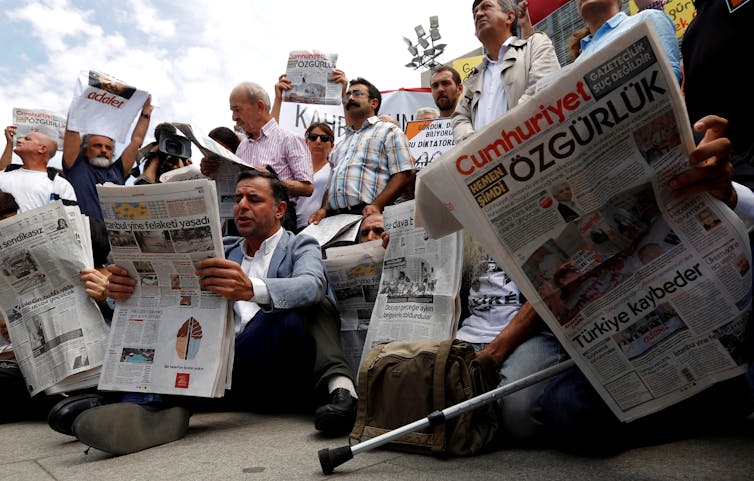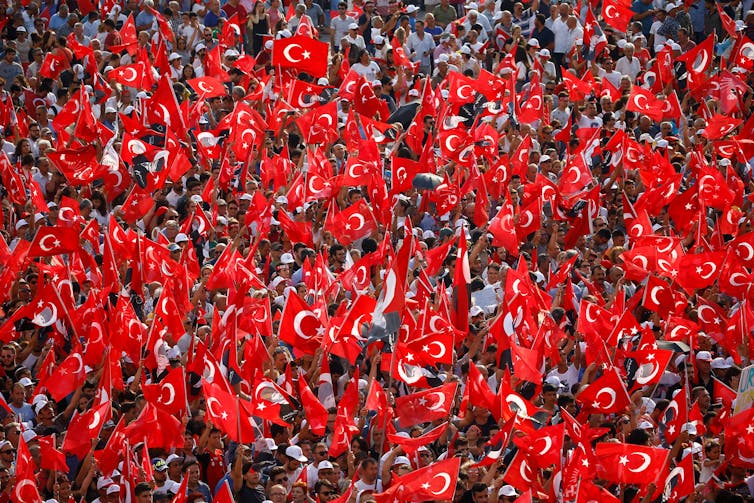Turkish currency isn't the real problem for Erdoğan, it's democracy
- Written by Gary M. Grossman, Associate Director, School for the Future of Innovation in Society, Arizona State University
Turkish President Recep Tayyip Erdoğan is presiding over the damaging loss of value of the Turkish currency, the lira[1], against foreign currencies. It’s the most severe economic crisis the country has faced since he assumed power.
Erdoğan has been the dominant figure in Turkish politics[2] for almost two decades. Can he and his party maintain political control through this moment?
As an American scholar[3], I began my engagement in Turkey in 1990, working with various government ministries, which allowed me to witness the linkages there between politics and policy.
My work in Turkey depended on finding clarity in the confusion of Turkish politics. For example, it used to be that party identification in Turkey would provide everything one needed to know about a person’s level of education, social class, religiosity and financial destiny.
But the predictable political verities have been shattered over the past 16 years, largely through the emergence of Erdoğan and his political party, known as the AKP, or the Justice and Development Party[4]. And a crisis that today looks like an economic challenge is, in fact, a symptom of a much larger problem for Erdoğan and Turkey.
Erdoğan at the polls
Turkey at the end of the 20th century was a political, social and economic mess[5]. The economy struggled throughout the period, most dramatically with a 50 percent fall in the Turkish lira’s value relative to the U.S. dollar one night in 2001[6].
In the dozen years before Erdoğan was elected, Turkey had 12 separate governments under nine different prime ministers and three presidents[7]. Government corruption was rampant[8].
 Erdoğan supporters wave Turkish flags during a trial for soldiers accused of attempting to assassinate the president during the failed 2016 coup.
REUTERS/Kenan Gurbuz
Erdoğan supporters wave Turkish flags during a trial for soldiers accused of attempting to assassinate the president during the failed 2016 coup.
REUTERS/Kenan Gurbuz
The Turkish parliamentary elections of November 2002[9] sent a shock wave through the nation’s political and military establishment.
Since the founding of the secular Turkish Republic in 1923[10], a constitutional pillar of government in Turkey has been the separation of religion and state[11]. This was interpreted by the military to be absolute and was part of the expressed rationale for the military interventions[12] of the past.
But this separation was also a growing source of conflict[13], given the strong religious allegiance of many of Turkey’s citizens.
In 2002 Erdogan’s party, the AKP, was a coalition of sorts, centered on the former Islamist Welfare Party[14]. Opponents accused the AKP of having a radical Islamist agenda[15], which its members denied. Parliamentary candidates from the established center-right parties joined AKP[16] to help it appear less religious and more mainstream, though much of the party’s appeal was to a conservative electorate that felt its religiosity had long been denied by the fervently secular Turkish government[17].
The AKP was wildly successful in the 2002 election and defeated 17 other parties[18], most of which were well-established. Prime Minister Bulent Ecevit’s party did not even get 1 percent of the vote[19].
Erdoğan was under a legal ban on holding office[20] but the AKP-led Parliament cleared him of all charges and he became prime minister four months later[21].
The elections of 2007 and 2011 further solidified AKP’s political dominance[22] and the centrality of Erdoğan – referred to by his supporters as “Büyük Usta,” the Great Master[23] – to Turkey’s politics.
Erdoğan’s heavy hand
Over the years, Erdogan engaged in increasingly repressive acts, including blocking access to social media sites[24] and exercising growing control of the country’s economic institutions, including Turkey’s central bank[25].
Since 2003, Erdoğan has consolidated his power[26], including purging former political allies.
 Press freedom activists read opposition newspaper Cumhuriyet during a protest in solidarity with jailed newspaper staff in 2017.
REUTERS/Murad Sezer
Press freedom activists read opposition newspaper Cumhuriyet during a protest in solidarity with jailed newspaper staff in 2017.
REUTERS/Murad Sezer
Erdoğan proposed a far-reaching new constitution in 2017 that changed the previously ceremonial office of president[27] to serve as the head of both government and state. It was approved overwhelmingly by voters[28].
Erdogan also supported increasing Islamicization in Turkey, proposing to raise a “pious generation” of children in an expansion of the country’s religious schools[29].
An abortive coup in 2016 aimed to oust Erdoğan[30]. In the aftermath, Erdoğan imposed emergency rule[31], which meant that even those freedoms guaranteed by the Turkish Constitution could be abridged without recourse to the courts.
Thousands were jailed, many thousands more lost their posts in government, academia and the press[32] for the mere appearance of opposing Erdoğan.
So even after the Turkish electorate had voted to give Erdoğan an unprecedented degree of power, these anti-democratic actions – many of which were highly unpopular – had the potential of causing Erdogan’s downfall.
 Supporters of Muharrem Ince, the opposition presidential candidate, at a campaign rally in June 2018.
REUTERS/Osman Orsal
Supporters of Muharrem Ince, the opposition presidential candidate, at a campaign rally in June 2018.
REUTERS/Osman Orsal
Challenging Erdoğan and democracy
Turkey’s June presidential election represented both a threat to Erdoğan’s power over the electorate as well as a test of the viability of Turkey’s democratic institutions.
Coalitions were formed among political parties, diminishing the number of possible candidates. This provided a clearer voter choice between those embracing Erdoğan’s “New Turkey” – a more religious and conservative Turkey – and the more secular, liberal voters actively resisting Erdoğan’s rule.[33][34][35]
Left and right joined together in a “People’s Alliance”[36] and most of the alliance coalesced around Muharrem Ince of CHP[37], who drew crowds of hundreds of thousands to his rallies.
Erdoğan nevertheless collected 52.5 percent of the vote[38], 20 points beyond Ince’s total and far exceeding the other two major candidates.
However, Erdoğan’s party, the AKP, failed for the first time to gain a majority in Parliament[39].
During the election campaign, Erdoğan used every means to temporarily stabilize the lira[40], maintaining pressure on the Central Bank to keep interest rates artificially low and use foreign reserves to prevent the lira’s devaluation.
That caused the lira to weaken further and faster after the election, provoking a serious threat of rampant inflation now. Despite a recent small rally, the financial crisis is not over. The Turkish lira stands to lose potentially 70 percent of its buying power since the beginning of the year[41].
Can democracy cure authoritarian rule?
The lira crisis is not the problem, it is a symptom of what’s wrong in Turkey. It was brought about by Erdoğan’s iron grip on the country’s institutions and his desire to goose the economy to cement his rule.
Behind the financial crisis is the undemocratic concentration of power in Turkey’s presidency and Erdoğan’s unchecked mismanagement.
But if Erdoğan’s goal has been autocratic rule, his use of democratic means to achieve it may well be his undoing.
That is the central irony of the past 16 years.
In the past, the military suppressed the vote by prohibiting some parties from participation in Turkish elections[42]. But the elections of 2002-2018 were the most democratic[43] in Turkey’s history, open to the participation of the entire electorate.
While Erdoğan cleverly used democracy to gain absolute power, in the words of Ersin Şenel, a noted Turkish political scientist, “It can’t last[44].”
Turkey has four active and viable parties in Parliament. Erdoğan ended emergency rule after the campaign[45]. Muharrem Ince remains an enormously popular political figure in Turkey[46].
The financial crisis provoked by the lira’s fall masks the true drama in Turkey today: The democratic means exist to defeat Erdoğan. What will Turkey’s voters – with their economy and livelihoods hurt by Erdoğan’s mismanagement – do with their power now?
References
- ^ Recep Tayyip Erdoğan is presiding over the damaging loss of value of the Turkish currency, the lira (www.nytimes.com)
- ^ Erdoğan has been the dominant figure in Turkish politics (www.theguardian.com)
- ^ As an American scholar (sfis.asu.edu)
- ^ AKP, or the Justice and Development Party (www.britannica.com)
- ^ political, social and economic mess (www.economist.com)
- ^ one night in 2001 (news.bbc.co.uk)
- ^ nine different prime ministers and three presidents (www.umich.edu)
- ^ Government corruption was rampant (www.researchgate.net)
- ^ The Turkish parliamentary elections of November 2002 (www.washingtoninstitute.org)
- ^ secular Turkish Republic in 1923 (www.britannica.com)
- ^ separation of religion and state (www.aljazeera.com)
- ^ for the military interventions (www.aljazeera.com)
- ^ a growing source of conflict (theconversation.com)
- ^ on the former Islamist Welfare Party (www.nytimes.com)
- ^ radical Islamist agenda (www.cnn.com)
- ^ established center-right parties joined AKP (www.washingtoninstitute.org)
- ^ the fervently secular Turkish government (theconversation.com)
- ^ defeated 17 other parties (www.nytimes.com)
- ^ get 1 percent of the vote (www.nytimes.com)
- ^ holding office (www.nytimes.com)
- ^ prime minister four months later (www.britannica.com)
- ^ solidified AKP’s political dominance (theconversation.com)
- ^ “Büyük Usta,” the Great Master (www.politico.com)
- ^ blocking access to social media sites (www.theguardian.com)
- ^ including Turkey’s central bank (www.reuters.com)
- ^ has consolidated his power (www.dw.com)
- ^ previously ceremonial office of president (www.brookings.edu)
- ^ approved overwhelmingly by voters (www.dailysabah.com)
- ^ of the country’s religious schools (www.reuters.com)
- ^ aimed to oust Erdoğan (www.aljazeera.com)
- ^ Erdoğan imposed emergency rule (www.ft.com)
- ^ government, academia and the press (www.nytimes.com)
- ^ Coalitions were formed (www.aljazeera.com)
- ^ Erdoğan’s “New Turkey” – a more religious and conservative Turkey (www.aljazeera.com)
- ^ more secular, liberal voters actively resisting Erdoğan’s rule. (www.fpri.org)
- ^ in a “People’s Alliance” (www.aljazeera.com)
- ^ Muharrem Ince of CHP (www.theguardian.com)
- ^ 52.5 percent of the vote (www.bbc.com)
- ^ gain a majority in Parliament (www.aljazeera.com)
- ^ Erdoğan used every means to temporarily stabilize the lira (www.bloombergquint.com)
- ^ since the beginning of the year (www.forbes.com)
- ^ in Turkish elections (www.nytimes.com)
- ^ were the most democratic (foreignpolicy.com)
- ^ “It can’t last (www.theguardian.com)
- ^ after the campaign (www.reuters.com)
- ^ political figure in Turkey (www.theguardian.com)
Authors: Gary M. Grossman, Associate Director, School for the Future of Innovation in Society, Arizona State University
Read more http://theconversation.com/turkish-currency-isnt-the-real-problem-for-erdogan-its-democracy-101727

